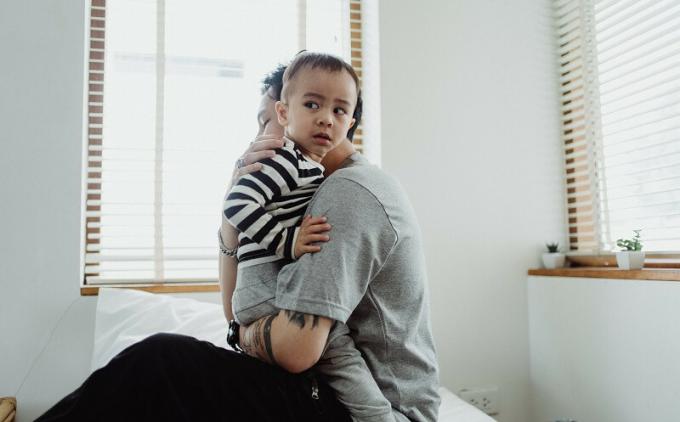Educational Styles: Ineffective Parental Beliefs and Behaviors
Since in the sixties Diana Baumrind proposed her classification of the different educational styles Until the present time, various investigations have been aimed at reviewing and updating the knowledge that is available in this area of psychology.
Most of the different proposed theoretical models have valued as determining factors in the distinction of variable educational styles such as: the level of control, power exercised, the degree of affection, the level of maturity demanded, the support and care expressed or also the type of communication between parents and minors.
Initially, the classification proposed by Baumrind (1966) differentiated three classes of educational styles: authoritarian, permissive and democratic. Later, McCoby and Martin (1983) combined control factors and affective involvement to give rise to four categories: reciprocal, repressive, indulgent and negligent. In the 1990s, other authors such as López Franco (1998) or Torres et al. (1994) have developed models that, in essence, maintain many of the elements of previous theories.
- Related article: "Educational psychology: definition, concepts and theories"
The family as the main socializing agent
On the other hand, it cannot be doubted that the family is the infant's main socializing agent in the first years of life.
Thus, parental figures exert an enormous influence on children by transmit to them both the set of beliefs and moral values, as well as the behaviors and actions that they consider most appropriate for the maturational development of their progeny.

- You may be interested in: "Socializing agents: what are they, types, characteristics and examples"
The PEE proposal: educational styles and associated psychological effects
Studies conclude that there are significant differences in the psychological configuration and personal development of the infant depending on the educational style and of the socialization strategies that parents tend to apply with their children at a pedagogical level.
Specifically, Magaz and Pérez developed in 2011 a useful psychometric test to assess the educational style of parents, the PEE (Profile of Educational Styles), which reflects some examples of parental beliefs and behaviors related to four types of profiles: overprotective, inhibitionist, punitive and assertive.
These are some of these approaches that are ineffective and / or harmful, when considering the emotional and behavioral consequences that derive from these in shaping the personality of the little ones.
- You may be interested in: "How to set limits for children: 10 tips to educate them"
1. Overprotective educational style
- "Life is already very hard and as long as I can make it easier for him until he grows up, I have to do it so that he enjoys as much as possible."
- "He is still too young for ...".
According to the authors, these types of beliefs correspond to a parenting style called overprotective, since It is based on values of hyper-responsibility and high guilt on the part of the parents in the face of potential adversities that the child may suffer. Thus, the possibility of this / a learning to use autonomously and actively take responsibility for their own behaviors is inhibited.
This excessive parental concern and nervousness can cause the minor to take initiatives and develop a low level of self-concept, since she has not had the opportunity to practice self-care or social interaction skills, as well as can generate a high level of insecurity personal.
- Related article: "Overprotected children: 6 educational mistakes that harm them"
2. Inhibitionist educational style
- "If I solve problems for him, he will never learn to face them on his own."
These types of ideas are typical of an inhibitionist education, since in the totally opposite pole to the previous one, there is a high blamelessness and an almost zero level of responsibility is exercised by the parents. This kind of parents feel upset or nervous when the little one asks for help and they are calm alone when he / she acts independently and autonomously, since they tend to confuse the concept of help with that of dependence. On the other hand, these types of parents tend to pay very little attention or recognition to properly "normalized" behavior. of the minor at the same time that they carry out random punishments for inappropriate behavior, without a coherent criterion or consistent.
The consequences of practicing this kind of parenting can be negative for the offspring, causing the continuous search for support in other authority figures, as well as the tendency to develop a general lack of interest and carelessness in dealing with matters that concern them. Deficits of social skills, specifically in the ability to empathize with others.
3. Punitive educational style
- "My son has to learn to behave appropriately."
This style corresponds to a punitive education, which is based on values such as demand, intolerance of alternative points of view and misunderstanding. Parental reactions are usually one of explosive anger when the child disobeys instructions and lack of recognition of appropriate "normative" behaviors.
On the other hand, these types of parents behave critically and they tend to fixate on the mistakes or imperfections of their children, exclusively valuing outstanding stocks. Thus, they issue frequent and disproportionate random punishments and advance threats. They also tend to attribute to the person the qualities of the concrete behavior, in a way that stigmatizes and generalizes negative characteristics of the little ones.
The effect that this educational dynamic has on the child is the development of a high level of ungratefulness and normalization of criticism, high levels of anxiety and personal insecurity, at the same time that a negative level of self-concept may appear. A feeling of resentment towards the educator is normalized and decision-making tends to be based on criteria of failure or punishment rather than orientation to success.
- You may be interested in: "What is anxiety: how to recognize it and what to do"
4. The assertive educational style
- "It is important that you learn to behave appropriately and that you acquire habits and personal skills."
- "You will learn little by little as you practice and make your own mistakes."
- "It is reasonable that their tastes, wants and needs may differ from those presented by the people around them."
These approaches are those of an assertive educational style. In this case, parenting is based on values such as patience, tolerance, understanding and responsibility balanced with freedom.
Thus, parents understand that errors and inappropriate behaviors are understood as natural in the child. learning process and personal maturation, although on the other hand they apply consequences to said behaviors in order to promote the value of the responsibility of the child.
On the other hand, attention is paid to progress and achievement or appropriate behavior is recognized as something positive, and the expression of one's own tastes and opinions is also valued.
Contrary to the previous one, the parents do not usually attribute the qualities of the behavior to the person, so they do not generalize or label the child negatively.
This style entails in the minor the development of healthier consequences derived from the recognition and positive reinforcement obtained from their parents. This causes a higher level of consolidation of learning at a personal and social level, as well as the promotion of a level of Favorable self-concept, greater personal security and a degree of motivation for the achievement of individual goals more positive.
On the other hand, children raised this way often learn to tolerate criticism appropriately and to base active decision-making on more rational issues, such as the consequences that these can cause.

